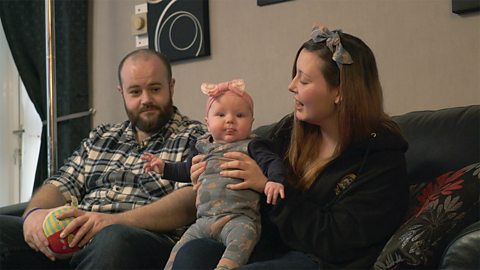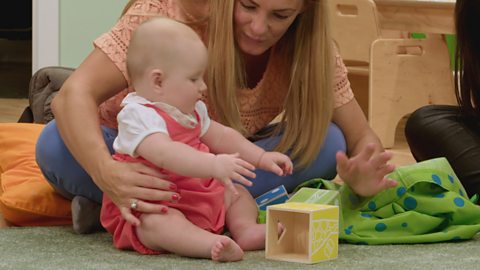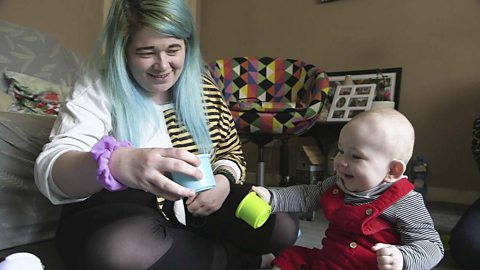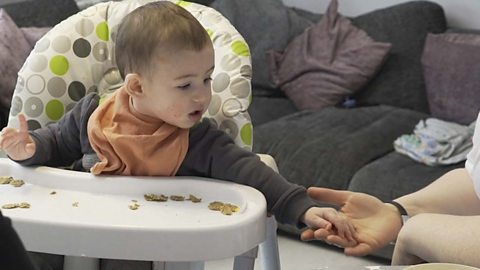Did you know that from as young as 2 months, babies are starting to understand what a conversation is and can take part in conversation-like exchanges?
Even though they are way off saying words, they will still try and respond to you if you leave gaps when you talk.
Studies have shown that the more babies take part in back-and-forth interactions with adults, the more activity they have in the part of the brain responsible for language production and processing.
The short video below explains the science behind taking turns with babies and why it's so important for their development.
Dad
Oh are you standing up? Yes. Oh where’s the smiles? Say hiya.
Trish (Health Visitor)
What kind of things are you finding Poppy doing now?
Mum
Poppy is three months old right now she's really good right now for kind of babbling away. We do our wee baby conversations, don't we? And sticking out her tongue there! She's like “this is what I've learnt". So the other day she started sticking out her tongue in response to me, giggling as well, she started laughing, particularly like when I go 'achoo'. That seems to be what triggers it right now isn't it?
Cristina (SLT)
Over the last few months, your baby has been enjoying chatting with you more and more and they really want to join in.
Mum
Where's your tongue?
Trish
When she's lying on the mat like this at certain times of the day, do you find this is when she's the most responsive?
Mum
Yeah lying down when she can see our faces definitely. Are you doing your tongue? Where is it? There we go, clever girl! Hello, oh that's it.
Cristina
When you pause, you're giving your baby time to practise and you're showing them with your face that you're listening to them. When you then respond to their sounds as though they're telling you something really important, you're showing them how to take turns in a conversation.
Dad
Ah good girl, what's that Poppy?
Mum
Can you tell me more?
Dad
Poppy? Hello.
Mum
She's sticking her tongue out at the mat.
Dad
Hiya? What are you saying to it, telling stories? Hello!
Cristina
Your baby is learning so much from this very simple game of cooing and taking turns with sounds. They're learning about the sounds of the language that they're going to learn and they're also learning how to coordinate their own mouth muscles to make those sounds.
Mum
Beep beep! Beep beep! You like that?
Cristina
A lot of this activity takes place in the temporal and frontal lobes of the brain. These areas are also responsible for supporting your baby’s social development, helping them recognise faces and emotions.
What do babies learn from taking turns?
- The back and forth of conversation and how to take part in a conversation
- The sounds of the language that they're going to learn
- How to coordinate their own mouth muscles to make those sounds
- How to recognise faces and emotions and facial cues

When do babies learn about taking turns?
At around 3 months old, you might notice your baby wants to join in with your conversations more and more.
They are figuring out that conversations mean to take turns and that we use our mouths, voice and breath to take these turns.
At this age, babies learn a lot about the sound patterns in their language and how they can use their muscle movements to be able to join in.
Cooing is what happens before your baby knows how to skilfully link their breath, mouth and tongue movement. The brain areas in charge of speech production at the front of the brain work hard to try and master this skill and practise making the right connections.
Babbling comes later. Babbling is a combination of consonant and vowel sounds. It is often single syllable sounds like “pa” or “ba”.
It's really important to react to your baby when they make these sounds. Coo or babble back and then pause. Give them plenty of opportunity to respond.
When you pause, you're showing them with your face that you're listening to them. When you then respond to their sounds as though they're telling you something really important, you're showing them how to take turns in a conversation.

Taking turns around Tiny Happy People
- A speech and language therapist breaks down why it's important to start mini-conversations with your baby
- What's going on in your baby's brain when you respond to their baby babble?
- Blowing raspberries is more than just a bit of fun for little ones, it can help them learn to communicate too!
- Why is it important to copy your little one at every opportunity?






